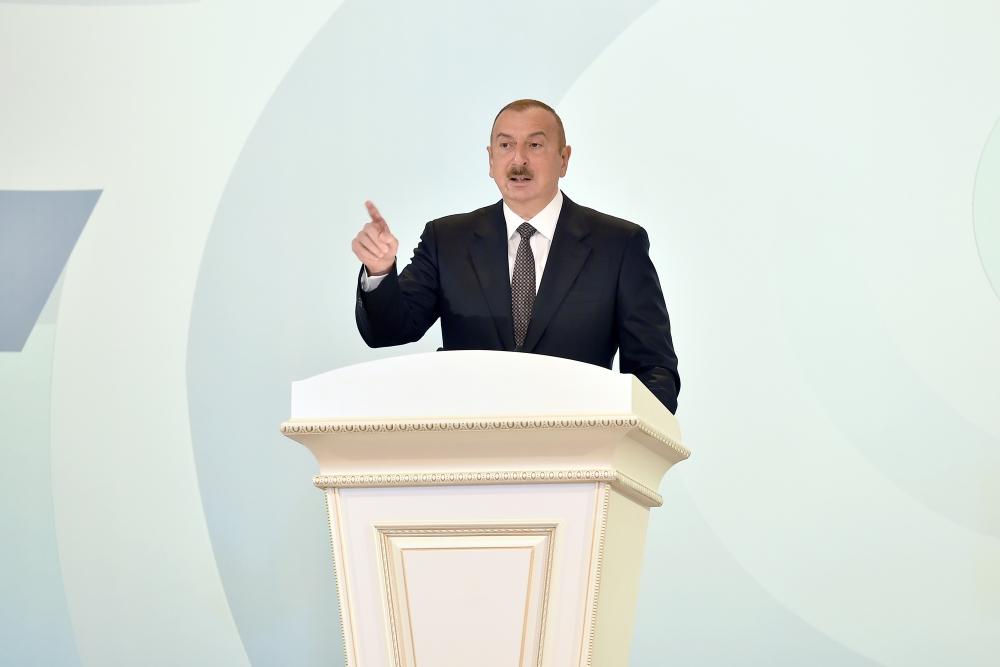BAKU, Azerbaijan, Nov. 25
Trend:
Under great leader Heydar Aliyev, the percentage of the Azerbaijani population in Nagorno-Karabakh increased sharply and doubled, Azerbaijani President Ilham Aliyev said while speaking at an event to mark the 70th anniversary of the city of Sumgayit.
“During Heydar Aliyev’s leadership, Sumgayit developed as a modern industrial city,” Ilham Aliyev noted. “New residential buildings were built, social facilities were set up, parks and alleys were established, trees were planted, and Sumgayit developed in the Soviet Union as an important industrial city of all-Union significance. After great leader Heydar Aliyev left for Moscow in 1982, a period of recession began in Sumgayit, as was the case elsewhere in Azerbaijan. The then leaders of the republic did not fully realize their responsibility, did not exercise control over the processes, and as a result of this, it is possible to say that there was no development in Azerbaijan, a period of stagnation set in.”
“As a member of the Politburo and first deputy chairman of the Council of Ministers of the Soviet Union, Heydar Aliyev always provided assistance and paid attention to Azerbaijan,” the Azerbaijani president added. “Despite this, there was a recession in the republic, especially starting from 1985, after the period of "perestroika" began in the Soviet Union. Very negative processes began to unfold in the Soviet Union, including Azerbaijan. It is no coincidence that six years after the start of the policy of "perestroika", such a gigantic state as the Soviet Union fell apart.”
“In 1985, Azerbaijan was faced with great difficulties because stagnation reigned in the economic sphere,” Ilham Aliyev said. “At the same time, Armenian nationalists raised their heads both in Nagorno-Karabakh and in other places of our republic, including Sumgayit. Under great leader Heydar Aliyev, the percentage of the Azerbaijani population in Nagorno-Karabakh increased sharply, it doubled to reach 30 percent. If Heydar Aliyev had not left for Moscow in 1982 and stayed in Azerbaijan, then the Azerbaijani population could have reached 50 percent within 10 years. Armenian nationalists in Nagorno-Karabakh raised the issue of separating Nagorno-Karabakh from Azerbaijan and annexing it to Armenia. Unfortunately, the leadership of the Azerbaijan Republic remained indifferent to this issue, did not realize its responsibility and thus lost control over the situation.”
“At the same time, Armenian nationalists managed to build a nest in Sumgayit, and an impetus was given to negative processes here too,” the Azerbaijani president added. “I have to say that there were several reasons for the collapse of the Soviet Union. The main reason was that economic relations were built incorrectly. The planned economy did not justify itself. In the 1980s, the development of the Soviet Union was based more on the oil factor, and after a sharp drop in the oil price on world markets, revenues declined, and it was not possible to generate these revenues from other sectors. Therefore, of course, the economic factor played a major role. At the same time, after 1985, gross errors were made in ethnic policies in the Soviet Union. The Soviet Union as a large multinational state was also maintained by ethnic policies.”
“The nomination of national personnel from union republics was commonplace,” Ilham Aliyev said. “In 1985, a tangible blow was dealt to this area. We remember only too well that the attitude towards Muslim republics was very negative at the time. Defamatory campaigns were waged against leaders of Muslim republics. All-Union media published only negative articles about these republics. Investigative groups were sent to these republics from the center and there was an impression that the situation in the republics of Central Asia and Azerbaijan was terrible, the situation was critical and leaders of these republics could not cope with their duties.”
“Of course, there were both violations and miscalculations in each republic, but this also happened in other republics,” the Azerbaijani president noted. “Why weren’t investigative groups sent to Armenia, Georgia, Ukraine, Moldova and other republics? They were sent only to the Central Asian republics and Azerbaijan. Thus, the ethnic policy, which was the cornerstone of the Soviet Union, was disrupted.”






